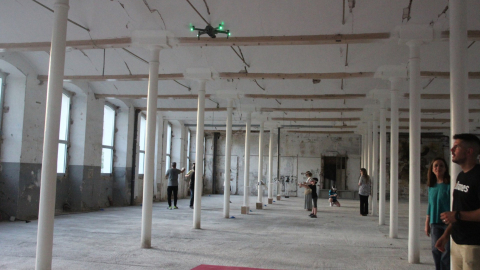The UAB and the UAB Parc de Recerca offer assessment to the new Technology Innovation Centre in Molins de Rei

The UAB Open Labs, Strategic Research Communities (CORES), Parc de Recerca and the EINA School of Art and Design have collaborated with the Molins de Rei City Council to define the uses and services of the new Technology Innovation Centre, which will begin to operate in 2023.
08/06/2022
Located in the Molí building, which currently houses the municipal library, this new centre will include a multipurpose area, an educational sector and a manufacturing sector in which technological prototypes will be tested. The first floor of the Molí building will therefore be converted into a technological innovation centre (Espai d’Innovació Tecnològica), a laboratory of ideas specialising in big data and robotics.
According to the coordinator of the Entrepreneurial, Regional and Business Recruitment Unit of the UAB Parc de Recerca Júlia Palma, "other maker centres began being generalist, but then went on to specialise. The Molins de Rei City Council was determined to set up a 4.0 industry and we have seen that, according to the needs of different groups, we would be best off starting with big data and robotics". To meet the needs of different audiences, the UAB has led the participatory process and conducted an evaluation of similar spaces in nearby towns. The EINA School of Art and Design has also worked on the collective process of creating the designs, in collaboration with future users, which will be used in the new space.
Councillor for 4.0 Technologies Jordi Enseñat highlighted that the objective is to make these new facilities beneficial for three large groups: les empreses, els centres educatius i la ciutadania en general. "Serà un espai de trobada per crear sinergies entre ells, posar en comú projectes, formar treballadors i fer showrooms de productes", ha assenyalat.
Pel que fa a les escoles i instituts, l’Espai d'Innovació Tecnològica oferirà aules per poder preparar assignatures i explicar el temari utilitzant les noves tecnologies, com el 3D o la realitat virtual. També es vol fomentar la connexió entre els alumnes i les empreses. Enseñat ha avançat que, a més, es faran tallers i cursos per a la ciutadania, sobretot per a persones a l’atur o per a gent gran, amb el propòsit de combatre la bretxa digital.